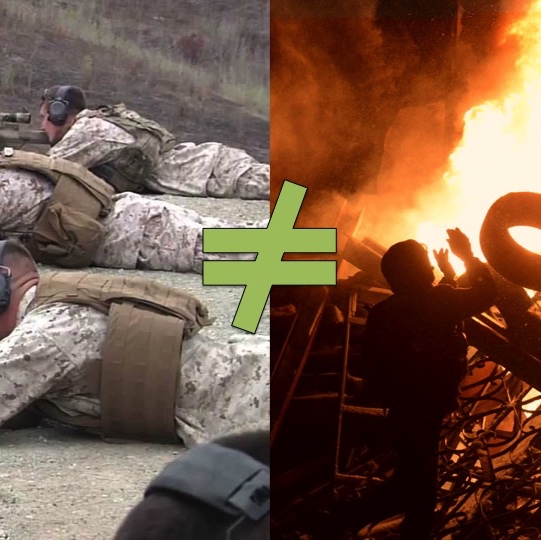
You might have been in the same unit. You probably were in the same branch of service at the same time as them. In other circumstances, at other times, it could have been you that spent the night in jail alongside them. In El Paso County, Colorado, in 2016, there is an average of anywhere from 180 to 200 veterans and active duty service members incarcerated on any given night. Barring some very intentional choices on my part, it could have been me last night.
Before we get indignant, saying, “It would never be me, I’m not a criminal,” be careful to understand: they said the same thing, and they aren’t, either.
The circumstances that landed the veteran in jail are many and varied. I am not going to rail about the lack of fairness in the justice system, or lament about law enforcement professionals who, in most instances, are doing their best to keep the community safe. In many, if not the majority, of the cases that landed the veteran behind bars, the veteran did in fact violate the law. That is a fact, and a real one that must be considered.
You can see this video, and much more on veterans in the criminal justice system, at the Justice for Vets Website
Another fact, however, is that the causes for misbehavior in 2016 are not the same causes for misbehavior in 2000. There are situational and systematic influences on a veteran’s thoughts and emotions that lead to poor choices and reckless, dangerous behavior.
Don’t get me wrong. I am not some starry-eyed idealist that believes that the jails are filled with innocent veterans, victims of the system, who are simply misunderstood and wayward youth. I know that there are those former service members who commit heinous and horrendous crimes. The deadliest act of domestic terrorism in the United States was perpetrated by two former veterans. Jeffrey Dahmer and Dennis Rader, the BTK Killer, both served in the military. When deployed to Bosnia, I heard about the shooting at Fort Bragg’s Towle Stadium, and I arrived at Fort Bragg during the trials of three paratroopers former who were ultimately convicted for racially motivated murders in 1995. More recently, I was stationed in Colorado Springs during the chaos of ’07-’08. Each of these crimes were egregious and reprehensible.
The majority of the veterans who spent last night in jail were not in the same category as these, and it would be irresponsible to lump them all into the same pile. In the two years that I have been working with justice-involved veterans on a direct basis, the bulk of the charges fit into several specific categories.
First, alcohol or drug related charges. DUIs, overwhelmingly, which is certainly not a veteran-specific crime. When a veteran turns to drinking to cope, or blow off steam, or suppress the pain of memories and experiences, however, the likelihood of making poor decisions increases. That includes DUIs. Substance use is another factor; possession of, and even distribution and sale of, narcotics is a common reason for a veteran to find themselves behind bars.
Assaults. Bar fights, altercations at a party or at the club. Aggression is a way of life while deployed, and many veterans find it difficult to turn off the aggressive nature of their actions when they return home, if they are aware of it at all. Alcohol, again, plays a part in this.
Weapons charges. Alcohol and aggressiveness, again, contribute to mishandling firearms. Veterans are familiar with weapons, they are comfortable around them. I once had a veteran describe the sense of peace they had when they were carrying their pistol (in an open carry state, mind you). It gave him a sense of security, he felt calmer and not as hypervigilant. This is the nature of using something other than our own abilities as a coping technique…when the external object we use to cope, whether it be a companion animal, a weapon, or substances, is removed, then we are still left with having to manage the source of discomfort. Mishandling firearms while intoxicated, menacing or threatening someone with a firearm, these are also common reasons for criminal violations by veterans.
Relationship issues. I will attempt to be very careful here. Domestic Violence is a very real and serious issue that must be stopped. There is never a “real” or “good” reason for one domestic partner to slap, hit, punch, or choke their romantic partner or significant other. Harassing them, threatening them, withholding freedom of any form from them is never acceptable. It is not my intent to indicate that “PTSD causes domestic violence” or “all veterans are victims of circumstance” but there is often the challenge of a veteran’s lack of effective relationship skills, coping techniques, or stress management ability that contributes to the situation.
Rarely are these behaviors serially criminal in nature. That is a challenge when working with justice-involved veterans, attempting to determine motivation and reason behind the dysfunctional and antisocial behavior. Because that is one of the keys…to function as a productive society, we NEED to have veterans return from combat and reintegrate into societal norms. To get back into the workforce, engage in the public process, to go to school and become scientists and scholars.
The challenge, however, is that there is a period of adjustment for many veterans. The depth of those challenges are different for everyone. For some, a lack of a sense of purpose and meaning in their lives leads to a period of wandering and aimlessness, and their behavior never rises to the level of criminality. It is a very thin line, however, that separates behavior that is reckless from behavior that violates the law, and many times veterans cross that line. There have been several recent articles that have shed light on the experiences of veterans in the justice system; A&E’s documentary, “60 Days In”, relates the experience of a Marine who volunteers to go undercover in an Indiana jail and finds that 10% of his fellow inmates are veterans.
The majority of veterans leave the service strong and resilient. Many, however, do not, and that is a fact. Remembering that there are veterans who face, and fail to deal with, significant challenges is just as necessary as encouraging those who meet those challenges.
If you are a veteran, and have some time on your hands, I recommend that you take a look at the Justice for Vets website. Find a local Veterans Court and make a visit. You may see something that you didn’t expect. You may walk in and see someone you once deployed with, like I did, sitting in shackles and wearing the color of the local detention facility.
You may find yourself wondering just how close you are to being in the same situation.
Did you enjoy this post? Please comment below and share with your network in order to join the conversation regarding veteran mental health. You can sign up for updates from Head Space and Timing and follow Duane, a combat veteran and mental health counselor, on Facebook, Twitter and LinkedIn. Keep the conversation about #veteranmentalhealth going.



3 Comments
Estanislado Quinones · July 18, 2017 at 4:44 pm
The military does a great job training it’s people to go fight in far off lands and to kill people. When you are in country and gun-ho and you do the things that you been taught to survive and to take care of the people around you. You are doing your job and if you take down a lot of insurgents you become a person that others emulate. Which could be a legend by doing what your country asks. When in that environment even the quietest man and women become savages because it comes down to kill or be killed. When you are coming back and transitioning out of a combat zone that is where you start getting your briefs that start something like this. You have done a great job here. You are a hero, a man among men you have seen things that the common man will never see or experience. Now go back to your country try to catch up with your family, become part of your community and live a normal and respectful life. After killing people, seeing some of your friends die, some get traumatic brain injuries other lose limbs and some get wounded. No matter how hard you try, those experiences will never go away and you have to learn how to cope with them. You then come out and try to land a decent job to support your family and everyone wants to hire you at minimum wage. You start drinking and doing drugs and things start spiraling out of control because believe it or not while you were in a combat zone you did have some kind of control. Once you start getting into trouble and get a couple of felonies than someone sits you down and let’s you know that there is a problem after the VA has said that you don’t suffer from PTSDfor the fourth time. That is what has brought us to this point.
Let's Talk About Veterans for a Minute | Head Space and Timing · August 20, 2016 at 6:47 am
[…] A Veteran Spent Last Night in Jail. An extreme manifestation of a difficult transition is a veteran’s involvement in the justice system. Like many of our governmental systems, it’s not perfect, but then again, neither are we. […]
One Resource and One Reason to Talk About Veteran Mental Health | Head Space and Timing · February 3, 2017 at 6:02 am
[…] This video is from the El Paso County, Colorado Criminal Justice Center: the County Jail. This is taken in a jail ward that is set aside exclusively for veterans; every single one of the inmates you see in this video served their country at one point or another. The accumulated deployment time of the veterans in this ward probably approaches a century’s worth of combat. While there can be many discussions about personal choice and personal responsibility, this is a problem that happens way too often. […]
Comments are closed.